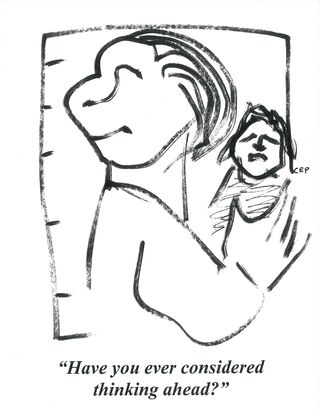

Problems can be costly and complicating. They take energy to contend with and make life more demanding: “What must I deal with now?” So, consider problems in three common forms: problems as something to solve, problems as something to persevere, and problems as something to suffer.
And, of course, major problems are often experienced as some mix of these basic three: “Moving and changing schools in seventh grade has upended my life!” Now the young person is figuring out the new middle school, is making every effort to form new relationships, and is sorely missing old friends left behind: “I’ve got problems on top of problems!”
To a degree, all unhappy problems are self-made because they are judgment calls about what is or isn’t happening that one decides is not OK. Painful problems are negative comparisons or complaints: “The way things are is not how I want them to be!” This discrepancy can create dissatisfaction that causes unhappiness: “I’m feeling really down about how things turned out!”
In simplest terms, there are only three ways to alleviate unhappiness problems. The person can change how things are to how they want things to be: “I feel better after getting things to go my way.” The person can change how they want things to be to fit how things actually are: “I feel better just adjusting to reality.” The person can do a mix of the two: “I feel better changing what I can and accepting what I can’t.”
Deciding they have a problem, a young person tells themselves that something needs fixing or changing in their life: “I’m not OK how I am.” At worst: “I'm never going to be like others who I like!” Now they have created a discrepancy between how things are and how they want things to be, thereby breeding dissatisfaction that can motivate corrective action. They may try to change something about themselves or in their world, or they may create an ongoing sense of discontent with themselves if they do not: “What’s the matter with me?” A lot of middle-school adolescents, in the throes of puberty and competition to socially belong, are tormenting themselves with this question, so it's important that parents never ask: "What's wrong with you?"
Young people can sometimes use help choosing their problems wisely: “You may have enough complaints about yourself right now without adding more.” Having said this, it can take courage to declare, confront, and then address a problem. Judging oneself deficient isn’t fun. People tend to be judgmental about how they are and how their life is unfolding: what is going right and wrong, well or badly, succeeding or failing, for example. Declaring a problem can address some deficiency and motivate desire for personal change: “I don’t have any friends!” However, problems don’t just specify something wrong; they can also motivate making something right. “I’m going to be a joiner, not a loner!” So, while problems can inflict pain, they can also motivate progress, sometimes combining a mix of both.
Parents can add to adolescents' problems. “How can you be OK letting schoolwork go?” asks the baffled parent of the capable young teenager who has given up caring about grades because now "social" feels like it counts more than "academic." One part of parental oversight can be declaring an adolescent problem where the young person wants his life left alone: “Performance now will affect your future opportunities; therefore, we will supervise your homework to see that it gets done.” Conscientious parents are often problem makers this way, sometimes unpopular on this account: “Quit bugging me!” The parents reply, “We are on your side, not against you. Keeping after you is a hard part of our job.”
THE BASICSHow should you advise your adolescent about problems? Maybe treat all problems as gifts of adversity—the opportunity to claim hard-earned benefits from coping with obstacles in life.
We may not enjoy the problems in our life, but people often gain capacity from coping with difficulties they bring. Thus, if a young person engaged with significant hardships growing up, she or he may have claimed valuable strengths on that account. Increased intelligence, persistence, and resilience can stand them in good stead as normal frustrations and setbacks of young adulthood unfold.
Resilience Essential ReadsWhat the young person discovers is this: When treated as tests, problems are often opportunities in disguise, having much of lasting value to teach from hard-earned experience. A kind of seasoned confidence can result: “Tough times I’ve known have prepared me for tough times ahead. I’ve been there before.”